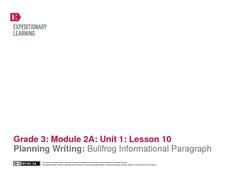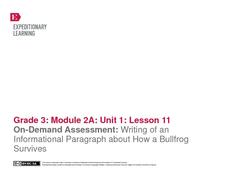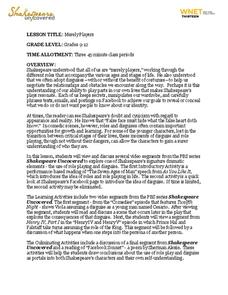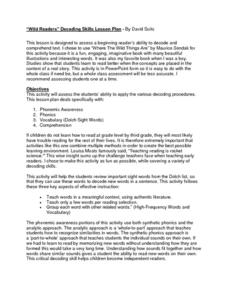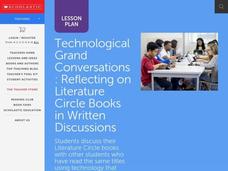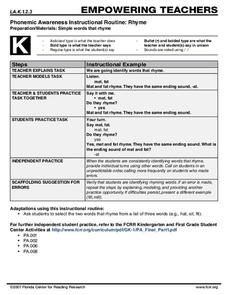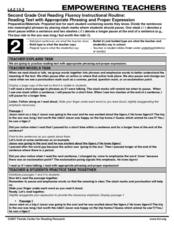EngageNY
Planning Writing: Bullfrog Information Paragraph
Lesson ten in this unit for the book Bullfrogs at Magnolia Circle, prepares third graders to begin writing an informational paragraph about the adaptations of bullfrogs. First, young writers work either independently or in pairs to...
EngageNY
Mid-Unit Assessment: Close Reading of Bullfrog at Magnolia Circle: Bullfrog Life Cycle
The sixth lesson plan in this Bullfrog at Magnolia Circle unit assesses your third graders' ability to read and understand informational text. The included assessment asks learners to take notes about the main idea and supporting details...
EngageNY
Close Reading of Bullfrog at Magnolia Circle: Main Ideas about the Bullfrog
As your class reaches the end of the book Bullfrog at Magnolia Circle, the seventh lesson in this literary unit helps third graders transition from reading narrative to expository writing. Scholars develop their note-taking skills as...
EngageNY
On-Demand Assessment: Writing of an Information Paragraph About How a Bullfrog Survives
Having read and discussed Bullfrog at Magnolia Circle, third graders demonstrate their bullfrog expertise by writing informational paragraphs. Building on the note-taking and paragraph planning from the previous lesson plan, learners...
EngageNY
Developing Reading Fluency: Criteria for Reading Aloud
Third graders develop their reading superpowers in a lesson plan on fluency. After first listening to an audio recording or teacher read aloud, the class works together identifying criteria for fluent reading, focusing on phrasing, rate,...
EngageNY
Developing Reading Fluency: Selecting a Text and Practicing Reading Aloud
Young readers continue to strengthen their fluency skills with a text of their choosing. The teacher first engages the class with an audio recording or read-aloud of a short poem, modeling for children how to read fluently. Next it's...
EngageNY
Developing Reading Fluency: Beginning the End of Unit 2 Assessment
Third graders continue to develop their reading fluency in preparation for their assessment in the tenth lesson plan of this unit. Young readers are provided with a short passage on Helen Keller, which they use while working in pairs...
Curated OER
Merely Players
Disguises and role playing are the focus of a resource that uses Shakespeare’s As You Like It, Twelfth Night, and Henry IV, Part I, to demonstrate how we all play many parts in our lives; how we all are “merely players.” The many...
David Suits
“Wild Readers” Decoding Skills Lesson Plan
Set young readers on the path toward fluency with this phonemic awareness resource. Based on the award-winning children's book, Where the Wild Things Are, this lesson allows beginning readers to practice isolating phonemes and...
EngageNY
Illustrating: Geography Icon
For the final step of the performance task for this unit, class members will create an illustration to go with the paragraph on their bookmark. After looking at models, guide pupils toward recognizing the criteria for an effective...
Curated OER
Active and Passive Voice: Finding Examples Online
Incorporate technological fluency with a search for examples of active and passive voice in online resources. Discuss how use of active or passive voice influences mood or tone and contributes to author's purpose. List of...
Curated OER
Technological Grand Conversations
Conduct a written literary discussion and diminish stress about public writing. Class members, already arranged into literature circles, compose and post responses to novels, signing with initials or class number. The process continues...
Curated OER
Setting the Story: Techniques for Creating a Realistic Setting
“It was a dark and stormy night.” Thus begins the 1830's novel Paul Clifford and, of course, all of Snoopy’s novels! Encourage young writers to craft settings for their stories that go beyond Edward Bulwer-Lytton’s often-mocked phrase...
Curated OER
Where
Kindergartners identify where a story takes place. In this literature lesson plan, learners take a picture walk and discuss how pictures can provide clues to the location of the story. They then illustrate where a new story of their own...
Curated OER
What is a Philanthropist?
What does a philanthropist do? Help your class explore philanthropy using character development and literacy ideas. Learners will define and give examples of philanthropy, listen to The Lion and the Mouse, discuss how the characters help...
Florida Center for Reading Research
Phonemic Awareness Instructional Routine: Rhyme
As a class, kindergarteners identify rhyming words. The teacher provides an example of a rhyming pair and explains why they rhyme. Individual learners then respond by saying a word that rhymes with a given word.
Curated OER
Oral Reading Fluency: Reading Text with Appropriate Phrasing and Proper Expression
Understanding punctuation is a vital part of reading with appropriate phrasing and proper expression. Second graders take care to emphasize each sentence and phrase they are reading based on punctuation. They read as a class and then on...
Curated OER
Identify Base Words and Suffixes to Read Multisyllabic Words #1
Show your scholars how adding an affix changes the entire meaning of a word; they focus on the suffix -able. You'll find a complete script here, but if you don't want to read this verbatim, use it simply as an outline. Learners watch you...
Curated OER
Introduce Vocabulary: Are Trees Alive? (Miller)
Explore the life inside trees as scholars learn vocabulary through Debbie Miller's informational text Are Trees Alive? Familiarize pupils with the new words they will hear like anchor, disease, awaken, harsh, and swell before reading....
Curated OER
Claims in "The Crisis, No. 1"
"The Crisis, No. 1" is the focus of a series of exercises that ask learners to read closely and annotate Thomas Paine's text. Groups identify claims and evidence in the essay and present their arguments to the class. Teacher background...
August House
The Great Smelly, Slobbery, Small-Tooth Dog
Read the story The Great Smelly, Slobbery, Small-Tooth Dog: A Folktale from Great Britain by Margaret Read MacDonald and choose from multiple activities to learn about the tale's theme—kindness. With so many options, your kind kids will...
August House
The Magic Pot
The Magic Pot by Patricia Coombs is the theme of this multidisciplinary lesson plan. Early readers first take part in a read aloud and grand conversation about the story's details. Then, they get to work practicing their skills in...
Curated OER
The True Confessions of Charlotte Doyle: KWHL
After completing the 11th chapter of The True Confessions of Charlotte Doyle by Avi, take part in a KWHL chart driven by the question,When is it appropriate and admirable to defy authority? Focusing on codes of conduct, scholars...
EngageNY
Talking with My Peers: Carousel of Reading Superheroes Around the World
In many places in the world, people go to great lengths to get books to read. This beginning-of-the-year activity uses pictures of people reading in extraordinary situations to stimulate effective listening and speaking using the...
Other popular searches
- 5th Grade Language Arts
- 3rd Grade Language Arts
- 4th Grade Language Arts
- Second Grade Language Arts
- English Language Arts
- 1st Grade Language Arts
- Kindergarten Language Arts
- Language Arts Jeopardy Game
- First Grade Language Arts
- Language Arts School Projects
- Language Arts Lesson Plans
- Language Arts Games


